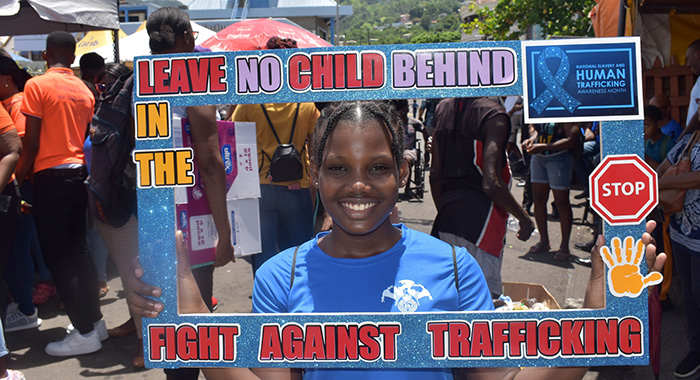The event, held under the theme “Leave No Child Behind in the Fight Against Human Trafficking”, featured musical renditions, poem recitals, and various displays of youth talent, emphasising the importance of protecting the most vulnerable members of society.
The chief crimefighter in St. Vincent and the Grenadines has highlighted the importance of fighting human trafficking, saying it is the second most profitable organised crime after drug trafficking.
Acting Assistant Commissioner of Police Trevor Bailey stressed the importance of education, prevention, and prosecution in combating this heinous crime.
He made the points on July 30 as scores of people gathered in Kingstown for a march and rally against human trafficking organised by the Anti-Trafficking in Persons Unit (ATIPU) of the police force.
The event aimed to raise awareness and foster community engagement on the United Nations Day Against Trafficking in Persons.
Bailey called for a united front against all forms of criminal activity, noting that public awareness and vigilance are crucial in the fight against human trafficking.
He also emphasised that the collective effort of the general public, law enforcement, and government agencies is essential to protect victims and bring traffickers to justice.
Meanwhile, Kevan Glascow, a social worker in the Ministry of Health, called for “vigilance, compassion, justice” as he delivered the social worker’s narrative.
He said every child must grow up in a safe environment and reminded the audience of their duty to protect children, ensuring that no child is left behind.
The social worker spoke about the importance of community involvement in safeguarding children and the pivotal role of social workers in providing support and intervention for at-risk youth.
Speaking on behalf of the United Nations Population Fund (UNFPA), Philcol Jeffers highlighted the importance of recognising victims and ensure their voices are heard.
He commended the Government of St. Vincent and the Grenadines and the police force for their strides in raising awareness about human trafficking.
Jeffers stressed the need to provide access to healthcare, psychosocial support, and essential services for victims.
He also emphasised the importance of bringing traffickers to justice and strengthening local frameworks to combat trafficking.
Jeffers called for continued collaboration between governmental and non-governmental organisations to ensure comprehensive support for victims and effective prosecution of offenders.
Meanwhile, Kesley Cambridge, a counsellor from the Child Development Division, spoke about the crucial role of the family in providing a safe environment for children.
He warned that without such an environment, children become vulnerable to trafficking. He encouraged listeners to report any suspicion of trafficking to the relevant authorities, emphasising the need for vigilance to ensure the safety of all children.
Cambridge also discussed the psychological impact of trafficking on children and the importance of early intervention and support to help victims recover and rebuild their lives.
Police Chaplain Adolphus Isaacs emphasised that human trafficking is not a new phenomenon and recounted the Biblical account of Joseph, who was sold into slavery by his brothers.
Issacs spoke of a need to protect the most vulnerable, particularly children, adding that ending child trafficking is a critical responsibility and that parents must take care and guide their children to prevent them from becoming victims.
The event concluded with closing remarks by the Attorney General of St. Vincent and the Grenadines, Grenville Williams.
He spoke about the reality that human trafficking offenders prey on the vulnerable, usually women and children, constituting a severe violation of human rights.
Williams appealed for an end to human trafficking and highlighted the strides being made in law enforcement in terms of legislation and victim support.
He spoke of the need for stronger laws and robust enforcement and reiterated the government’s commitment to combat human trafficking.
Williams also commended the police force for its excellent work in this critical area, urging the nation to remain vigilant and supportive of efforts to eradicate this crime.
“The event was a resounding call to action, demonstrating the RSVGPF’s commitment to eradicating human trafficking and protecting the nation’s most vulnerable citizens. The ATIPU’s initiative showcased the power of collective effort and the importance of education, advocacy, and law enforcement in combating human trafficking and ensuring a safe and just society for all,” organisers said in their press statement.







I looked all over the various small talk by all these professionals (I think they are) and didn’t see the word discipline. It has been missing for generations in streets, school, court, churches, homes and elsewhere.
How can parents control their children if they cannot discipline them? That’s the main tools they possess to take care of their children. It was also removed from the schools and that put both teachers and parents in a bottleneck if they try to or discipline children.
It only when these youths are confronted by the police then you see some form of discipline which often in death or hospitalization. And that’s too late.